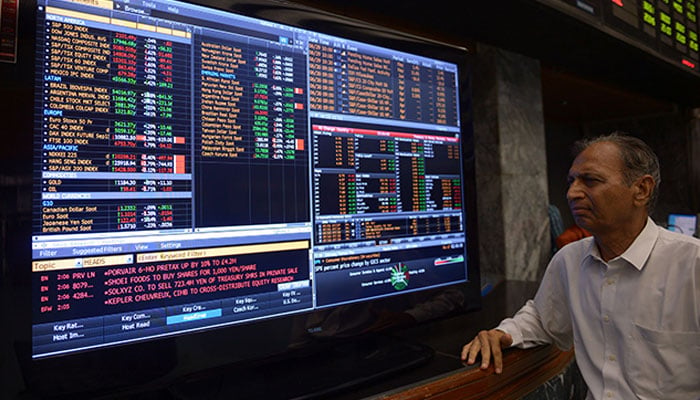Stocks all-time high, cross 82k mark
Pakistan Stock Exchange’s (PSX) benchmark KSE-100 Index rose by 615.16 points, or 0.76 percent
KARACHI: Continuing the positive momentum, the KSE-100 Index surged by 615 points to reach an all-time high, surpassing the 82k mark, driven by robust economic indicators.
The Pakistan Stock Exchange’s (PSX) benchmark KSE-100 Index rose by 615.16 points, or 0.76 percent, closing at 82,074.45 points, up from 81,459.29 points in the previous session. The day’s highest index level reached 82,372.20 points, while the lowest was recorded at 81,387.57 points.
Ahsan Mehanti, an analyst at Arif Habib Corp., commented, “Stocks closed higher amid a slump in Pakistan Investment Bond yields by up to 335 basis points due to receding inflation and improving liquidity, which is likely to invite further cuts in the SBP policy rate.”
He said that strong economic data, including a $75 million current account surplus, rising remittances and exports, inflows through the Roshan Digital Account (RDA) in August 2024, and the stability of the rupee, played a pivotal role in the bullish close.
The KSE-30 Index also increased by 234.45 points, or 0.91 percent, closing at 26,034.31 points, up from 25,799.86 points.
Traded shares rose by 21 million to 482.373 million shares from 459.037 million shares in the previous session. The trading value increased significantly to Rs30.188 billion, compared to Rs18.610 billion. Market capitalisation expanded to Rs10.723 trillion from Rs10.665 trillion. Out of 453 companies active in the session, 195 closed in the green, 196 in the red, and 62 remained unchanged.
Nabeel Haroon, an analyst at Topline Securities, said that the KSE-100 Index largely traded in the positive zone during the session, gaining an intraday high of 913 points. “This positivity can be attributed to lower-than-expected selling on account of the FTSE rebalance today. FTSE Russell, in its review, announced the reclassification of Pakistan from secondary emerging to frontier market status,” he said.
“Due to the FTSE rebalance, participation was at the higher end, with 482 million shares traded (up 5.2 percent DoD) worth Rs30.17 billion (up 68 percent DoD).”
The highest increase was seen in Unilever Pakistan Foods Limited, which gained Rs107.92 to close at Rs17,616.25 per share, followed by Service Industries Limited, which rose by Rs67.09 to Rs1,149.79 per share. A significant decline was observed in Ismail Industries Limited, which dropped by Rs31.79 to Rs1,625.94 per share, while ZIL Limited followed, closing lower by Rs23.53 to Rs215.70 per share.
Brokerage Arif Habib Ltd. reported that the KSE-100 Index ended the week on a strong note, closing at 82,074, in line with September’s traditionally bullish trend, with impressive week-on-week gains of 3.36 percent. Friday’s session saw heavy trading activity, particularly in the afternoon, driven by the FTSE rebalancing, as both domestic and foreign buyers absorbed supply.
With a significant portion of foreign supply cleared and the market closing at all-time highs, the coming weeks are expected to witness further upward momentum, with the KSE-100 now targeting the 86,000 level. Key support has risen to 80,000, the report added.
Ist. Capital Sec was the volume leader with 31.588 million shares, closing 3 paisas lower at Rs2.76 per share. Oil & Gas Development followed with 29.408 million shares, closing Rs4.57 lower at Rs141.29 per share.
Other significant turnover stocks included Fauji Fertiliser Bin Qasim, WorldCall Telecom, Pace (Pak) Ltd., Habib Bank, Kohinoor Spinning, Pakistan Petroleum, Hub Power Co. XD, and Cnergyico PK.
In the futures market, 320 companies recorded trades, with 155 advancing, 157 declining, and 8 remaining unchanged.
-
 Winter Olympics 2026: When & Where To Watch The Iconic Ice Dance ?
Winter Olympics 2026: When & Where To Watch The Iconic Ice Dance ? -
 Melissa Joan Hart Reflects On Social Challenges As A Child Actor
Melissa Joan Hart Reflects On Social Challenges As A Child Actor -
 'Gossip Girl' Star Reveals Why She'll Never Return To Acting
'Gossip Girl' Star Reveals Why She'll Never Return To Acting -
 Chicago Child, 8, Dead After 'months Of Abuse, Starvation', Two Arrested
Chicago Child, 8, Dead After 'months Of Abuse, Starvation', Two Arrested -
 Travis Kelce's True Feelings About Taylor Swift's Pal Ryan Reynolds Revealed
Travis Kelce's True Feelings About Taylor Swift's Pal Ryan Reynolds Revealed -
 Michael Keaton Recalls Working With Catherine O'Hara In 'Beetlejuice'
Michael Keaton Recalls Working With Catherine O'Hara In 'Beetlejuice' -
 King Charles, Princess Anne, Prince Edward Still Shield Andrew From Police
King Charles, Princess Anne, Prince Edward Still Shield Andrew From Police -
 Anthropic Targets OpenAI Ads With New Claude Homepage Messaging
Anthropic Targets OpenAI Ads With New Claude Homepage Messaging -
 US Set To Block Chinese Software From Smart And Connected Cars
US Set To Block Chinese Software From Smart And Connected Cars -
 Carmen Electra Says THIS Taught Her Romance
Carmen Electra Says THIS Taught Her Romance -
 Leonardo DiCaprio's Co-star Reflects On His Viral Moment At Golden Globes
Leonardo DiCaprio's Co-star Reflects On His Viral Moment At Golden Globes -
 SpaceX Pivots From Mars Plans To Prioritize 2027 Moon Landing
SpaceX Pivots From Mars Plans To Prioritize 2027 Moon Landing -
 J. Cole Brings Back Old-school CD Sales For 'The Fall-Off' Release
J. Cole Brings Back Old-school CD Sales For 'The Fall-Off' Release -
 King Charles Still Cares About Meghan Markle
King Charles Still Cares About Meghan Markle -
 GTA 6 Built By Hand, Street By Street, Rockstar Confirms Ahead Of Launch
GTA 6 Built By Hand, Street By Street, Rockstar Confirms Ahead Of Launch -
 Funeral Home Owner Sentenced To 40 Years For Selling Corpses, Faking Ashes
Funeral Home Owner Sentenced To 40 Years For Selling Corpses, Faking Ashes




